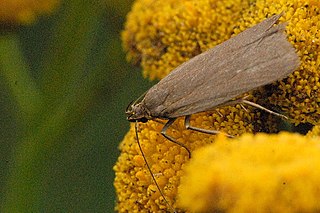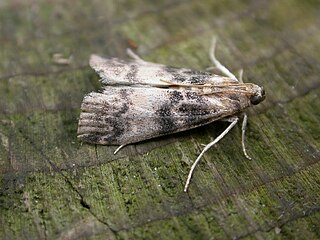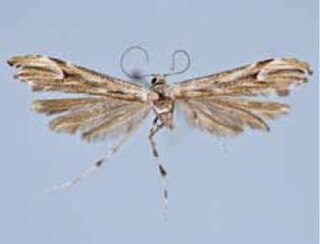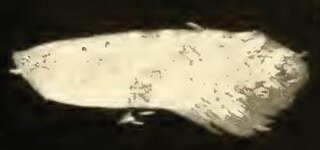
Agrotis photophila, the light-loving noctuid moth, is a species of moth in the family Noctuidae. It is endemic to Oʻahu, Hawaiʻi, United States.

Pempelia palumbella is a moth of the family Pyralidae. It is found in Europe.

Ypsolopha scabrella, the wainscot hooktip or wainscot smudge, is a moth of the family Ypsolophidae. The species was first described by Carl Linnaeus in 1761. It is found in Europe, China, Russia, Asia Minor and mideast Asia.

Scrobipalpa acuminatella is a moth of the family Gelechiidae. It is found in most of Europe, as well as Turkey, southern Siberia, Central Asia and China (Anhui). It was recently reported from Canada, with records from Ontario and Québec.

Euzophera pinguis, the tabby knot-horn, is a moth of the family Pyralidae. It was described by Adrian Hardy Haworth in 1811 and is found in Europe.

Homoeosoma nimbella is a moth of the family Pyralidae. It is found in Europe.
Xyroptila peltastes is a moth of the family Pterophoridae. It is found in Australia.

Stigmella cypracma is a species of moth of the family Nepticulidae. It is endemic to New Zealand and has been observed in the North and South Islands. The larvae of this species are leaf miners and pupate within their mines. The larval host species is Brachyglottis repanda. Adult moths are on the wing in February and September to November. This species has two generations per year.

Eupithecia pygmaeata, the marsh pug, is a moth of the family Geometridae. It is known from most of Europe, western and southern Siberia, the Russian Far East, northern Mongolia and North America .The species primarily colonizes floodplain and disused forests, bogs, river banks and marshy meadows. E. pygmaeata reaches up to 1800 meters in South Tyrol.
Ypsolopha oliviella is a moth of the family Ypsolophidae. It is known from the United States, including Arizona.
Ypsolopha schwarziella is a moth of the family Ypsolophidae. It is known from the United States, including Arizona, Utah and California.
Ypsolopha buscki is a moth of the family Ypsolophidae. It is known from the United States, including Arizona.

Oidaematophorus eupatorii, the eupatorium plume moth or Joe Pye plume moth, is a moth of the family Pterophoridae. It is found in North America, including Florida, Mississippi, Iowa, New York, California and Vancouver Island. It is also known from Mexico, Guatemala and Panama.
Hellinsia phoebus is a moth of the family Pterophoridae first described by William Barnes and Arthur Ward Lindsey in 1921. It is found in the US states of California and Arizona.

Oidaematophorus phaceliae is a moth of the family Pterophoridae that is found from Yukon to Ontario, south to California and Baja California. The habitat consists of boreal forest.
Arivaca is a genus of snout moths. It was described by Jay C. Shaffer in 1968.
Arivaca pimella is a species of snout moth described by Harrison Gray Dyar Jr. in 1906. It is found in the US in southern Arizona.

Perittia obscurepunctella is a moth of the family Elachistidae found in Europe.

Depressaria ultimella is a moth of the family Depressariidae. It is found in most of Europe, except Spain, Norway, Finland, Lithuania, Switzerland, Italy and most of the Balkan Peninsula.

Argyresthia pedmontella is a moth of the family Yponomeutidae. It is found in North America, including Colorado.











